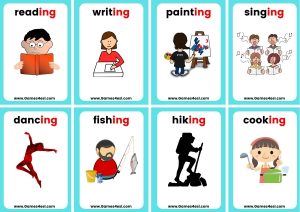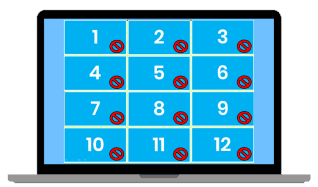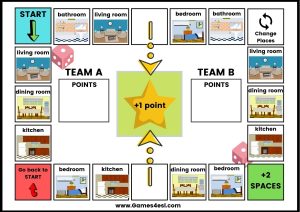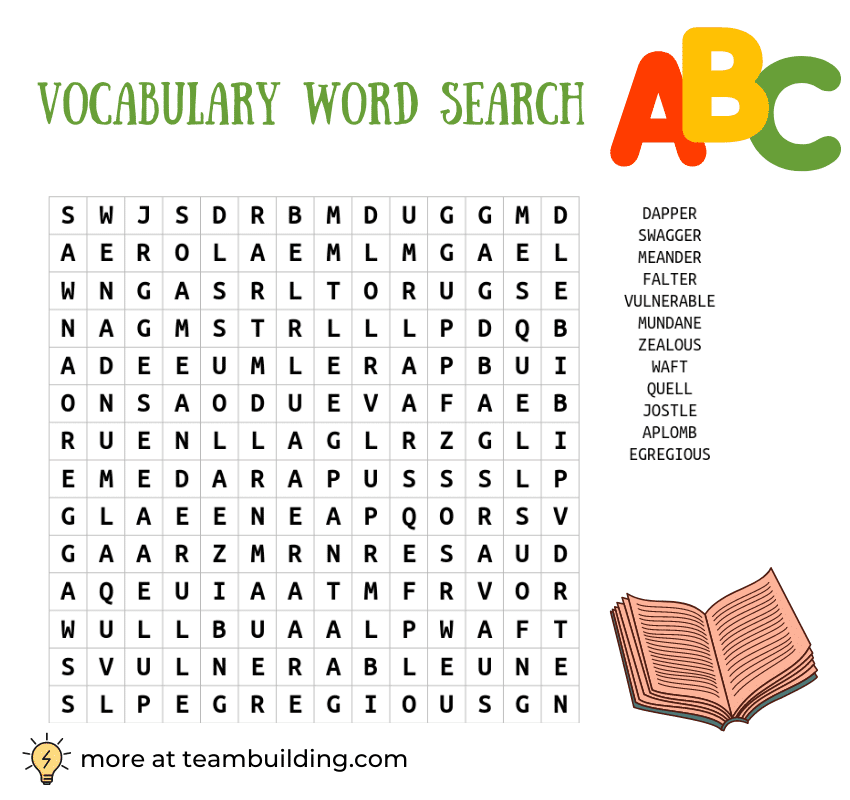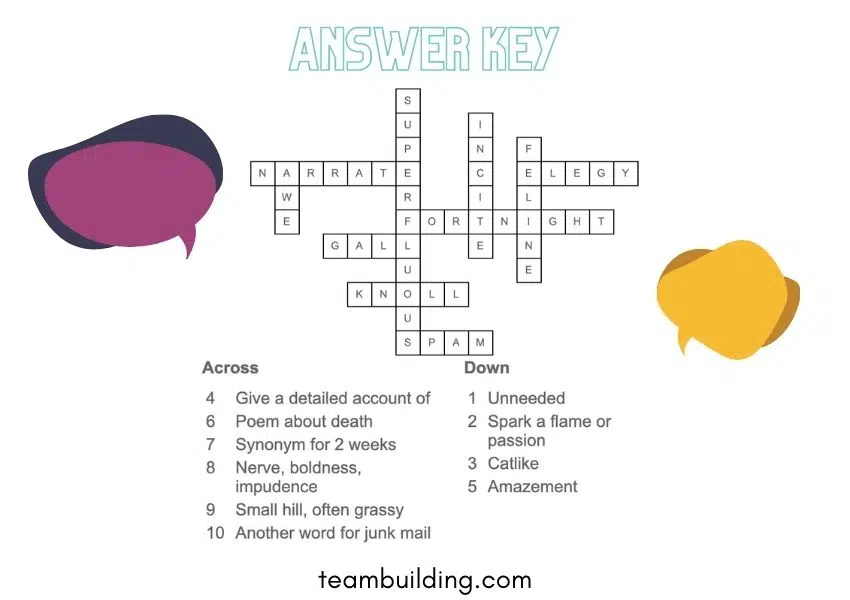The acquisition of new vocabulary is essential in terms of overall language advancement. However, there is always a need to review active words from time to time in order to use them fluently in speech. Here, we will present a couple of great vocabulary revision games which will perk up every classroom. Through these games the learners will feel how fun, entertaining and effective the learning process can be.
1. Charades
Charades is a fun and cool revision game. Students need to practice their acting skills to explain the words. This game is extremely easy to organize with minimal advance preparation. The only thing to be ready for is to keep a collection of vocabulary cards for the words you have studied.
The class is divided into two teams. Each team member takes turns acting out one of the words from the vocabulary set and explains it by acting out the word. If his or her own team can’t guess the word, the opposite team gets the chance to guess it. Each right answer equals one point.
Skyeng ищет преподавателей английского. Подробности по ссылке: Skyeng
2. Pictionary
Pictionary is also an entertaining game to play for vocabulary review. The rules are similar to those of charades except that instead of acting out the word, it is drawn on the board.
3. Bingo
Bingo can serve as a good revision game. From my experience, most of the groups/students like playing bingo because it gives them the chance to reflect on the words they have digested.
Students are given a blank bingo board and are asked to put the review words into the squares randomly. The teacher puts the active words in a hat or a box, takes them out one by one and defines them. If the student has a word corresponding to the definition, he crosses it out on his bingo board. When someone gets five squares in a row, they should shout, “Bingo!”
Check these articles out as well:
4. A memory style
A memory style card game can be another effective way for reviewing vocabulary. It requires some preparation before the game starts. For each word to be reviewed, one card should have the target vocabulary word and another card should have the definition of the word. You also need to have a big playing grid where you put the words and their definitions face down.
Each person turns over two cards each turn trying to find a match. If the cards do not match, he turns them over again and the next person tries to find a match. If he succeeds, he keeps the cards and gets an additional turn. The player with the highest number of cards at the end of the game wins.
The game can be modified even further. If you have accumulated enough synonyms or antonyms to the target vocabulary, you can practice matching target words to their antonyms or synonyms.
5. Categories
Categories is another awesome revision game which will make students energized and empowered. What they need for the game is to draw 4-6 columns on their paper and write a category at the top of each column. Categories fit the topics covered during the course. For example, if you have covered the business topics of Marketing, Work and Leisure, Ethics, Human Resources, Travel, you write these topics as categories.
You time the students and ask them to write as many words as possible under each category. As a further modification, choose a random letter and write it on the board. Give students enough time to write down a word for each category that starts with that letter.
Экономьте время на подготовку к урокам и проверку домашних заданий со Skyeng. Удаленный формат занятий, защита от внезапных отмен и график, который настроен специально под вас. Присоединяйтесь к нашей команде. Подробности по ссылке: Skyeng
6. Letter scramble
Letter scramble will make students really competitive and super fast. What you need is to take a list of words that your students have recently learned and write a scrambled version of each on the board. Students need to unscramble the words on their paper. The first one to finish deciphering all the words wins.
7. Stop the bus
Stop the bus is a cool game my students adore. I usually divide the class into 2-3 teams. One student from each team. This student sits on a chair facing his peers. Then from behind the student in the hot seat, show the other students a word from the lesson. The other students must try to describe what the word is without saying the actual word. And the student in the hot seat must guess.
The student who guesses the word shouts out “stop the bus” and checks the word with the teacher. If correct, the team gets a point. If wrong, other teams have the chance to guess the word by writing their versions on a piece of paper and passing the papers to the teacher.
8. Puzzles
Puzzles is another cool and easy tool to review the material in an effective way. What I like about this way of vocabulary revision is that students can work in pairs or groups while trying to find words matching the definition in the crosswords. They learn by listening to each other, cooperating to find the right answer. In this way, they both review the material and improve their teamwork skills.
Follow this link to get templates of different types of puzzles.
We also recommend watching a video with Alexei Konobeev. The speaker shared games to help your students remember new vocabulary. These games do not require special training and you can adapt them to any age and level.
We hope that all these games would serve their best to liven your vocabulary revision sessions and make them more meaningful and effective.
Which of these games have you tried? Which ones have you picked up for your next revision slot?

If you teach English to kids you probably know that young learners get bored easily. So, how do you get young learners interested in learning vocabulary? The best way is through fun and exciting ESL vocabulary games and activities. That’s why we put together this list of the best ESL vocabulary games to get your students excited about learning English.
For more classroom game ideas, check out our other post, 10 Fun Guessing Games for Young Learners.
1: Pass The Ball
This classic classroom game is incredibly fun and a great activity to get your students motivated and energized. It’s also a fun way to introduce or review vocabulary with students. All you need is a soft ball and some flashcards.
How To Play:
Students will pass the ball around the class and when the music stops, the student with the ball must answer a question from the teacher. For example, if you are teaching vocabulary to do with colors, the teacher might ask ‘What color is it?’.
Another way to play is, when the music stops, the student with the ball can ask the question and all the other students must answer. This way all students get to practice the vocabulary while playing the game.
2: Line Bingo
This ESL vocabulary game is a great alternative to regular bingo. Most textbooks these days come with small picture / word cards at that back that students can use for this game. If you don’t have these cards, visit our flashcard page where you can download and print these ‘student cards’ for free.
How To Play:
Give each student or pair of students one set of vocabulary cards. Ask them to place them in a horizontal line in any order they want. Once students have placed their cards in a line, the game can begin.
The teacher should say one of the words and if that word is on the left end or the right end of the line then students can turn that card over. If the card is in the middle of the line, students cannot turn it over.
For example, if you are teaching the present progressive / continuous tense you can ask students to shout out ‘What are you doing?’. Then the teacher can answer using one of the words on the card (e.g. ‘I am painting.’). Then students should look at their line of cards and check if ‘painting’ is on the left or right end of their line.
The first student / pair of students to turn over all their cards is the winner. To make this vocabulary game more fun, invite your students one by one to the front of the class to choose the next word.
3: Hot Seat
This simple no prep game is a great way to get students to utilize all their existing vocabulary while learning new words at the same time.
How To Play:
To play this game, you can divide the class into 2/3 teams or you can just play as a whole class. Choose one student to sit in the ‘Hot Seat’. This is a seat at the front of the class facing the other students.
Then from behind the student in the hot seat, show the other students a word from the lesson. The other students must try to describe what the word is without saying the actual word. And the student in the hot seat must guess.
Kids absolutely love this game and it is a great way to review vocabulary that your students have learned that lesson.
4: ‘1 2 3 Go!’ Game
For this vocabulary game you can use flashcards or you can simply write the words on the board.
How To Play:
Put the flashcards (or write the key words) on the board in a line. 6-8 words is the best. When the teacher says ‘ 1, 2, 3, Go!’ one student must jump up and shout the first word. Then another student must jump up and shout the second word. Then another student must jump up and shout the third word. And so on until all 6/8 words have been called out.
Any student can jump up and say any word at any time, but if 2 students jump up at the same time, then they lose.
This game can be played as a whole class, or if you have a large class, divide the class into teams.
5: Matching Games
These PowerPoint Games will test your students’ memories. Matching games are simple to make and great for reviewing vocabulary.
How To Play:
Divide the class into 2 teams. The aim of the game is to find two matching words / pictures. The teams will take turns choosing TWO numbers. Click on the square to reveal the word beneath. If the two words are the same, then that team gets a point. If they are different then click on red circle to hide the word again.
The game becomes more and more fun as it progresses because students start to remember where they saw the words. Download ready to use matching games and a blank template here.
6: The 4 Corner Game
This no prep classroom game is great to review vocabulary and as a listening activity.
How To Play:
Assign a word to the 4 corners of the classroom. Then, choose one student to come to the front and close their eyes. Then the other students have 5 seconds to move to one of the corners of the classroom. After the time is up, the student at the front will choose one of the words while keeping his/her eyes closed. The students standing in the corner with assigned with that word are out, and must sit down.
The game continues like this until one student is left. That student is the winner, and can be the next student to come to the front and close their eyes.
TIP: Many students moving around the class can be quite dangerous. For safety, instruct students not to run and make sure there are no bags, coats, books, etc, on the floor that the student can trip on.
7: Printable Board Games
Printable board games are easy to prepare and a great way to get kids talking using the vocabulary from that lesson. Download many printable board games and board game templates, and find detailed instructions on how to play them, here.
8: Hangman
If you’re not familiar with hangman, its a game where the teacher would think of a word and then draw a line for each letter of that word. Then students must try to guess what the word is by guessing letters of the alphabet.
In the traditional hangman game, if students guess wrong too many times, then the teacher would draw a man hanging from his neck on the board. Even though it is just a stick figure drawing, the idea seems quite gruesome and maybe not appropriate for children. That is why we made a fun alternative to hangman, ‘Save The Teacher’.
How To Play:
Think of a word and draw lines on the board corresponding to the letters in that word. Then ask students to guess letters of the alphabet to try to guess what the word is.
If students guess wrong, play the video and the fuse will get closer to the rocket. Pause when you see the pause sign and ask students to guess again. If students guess wrong too many times, then the rocket and the teacher will blast off into space.
Don’t worry, at the end of the video the teacher is okay and just went for a fun ride.
9: Hidden Picture Games
These PowerPoint games are easy to make and a great way to introduce or review vocabulary. Download ready made hidden picture games and an editable template here.
How To Play:
Click on the color shapes to make them disappear. As the shapes disappear the picture beneath is slowly revealed. When students are ready to guess what it is, they should raise their hand and guess while using the target language.
For example, if you are teaching vocabulary about animals, when the student guesses they should say ‘Is it an (elephant)?.
10: Whisper Game
This is a very fun classroom game and all you need is a board and chalk / a pen.
How To Play:
Write many words from the lesson on the board (at least 10). Then divide the class into two teams and ask them to make two lines in front of the board. Give the student at the front of each line a board eraser.
Next, the teacher should whisper one of the words to the students at the back of the lines. Then those students should quickly whisper the word to the next student in line, and then that student should whisper to the next student, and so on down the line.
When the word is whispered to the student at the front of the line, he/she should quickly run to the board and erase that word. The quickest one to erase that word wins a point for their team. Then change the student at the front and play again.
You found our list of fun and simple vocabulary games for adults.
Vocabulary games are activities that include language and wordplay. Example games include Word Association and Hang Man. Players can enjoy vocabulary games in person or online. The purpose of these games is to strengthen vocabulary skills. These games are also known as “vocab games”, “letter games” and “vocabulary building games.”
These games make great online classroom activities and communication games, and can be used as online fun activities for employees.
This list includes:
- vocabulary games for adults
- simple vocabulary word games for adults
- fun online vocabulary games and activities
- English vocabulary games
- vocabulary games in English
- games to improve vocabulary
- vocabulary building activities
- vocab review games
- vocabulary games for students
Get ready to play!
List of vocabulary games
From Pictionary to word scrambles to synonym memory, here is a list of fun word games to play in classrooms, at parties, or during meetings.
1. Vocabulary Pictionary
Pictionary is a game of charades where players draw words instead of acting them out.
To play:
- Split the group into teams.
- Each round, assign one team member to draw.
- Give the drawing team member a word.
- Allow up to sixty seconds for teammates to guess.
- If the team guesses correctly, then assign one point.
You can give other teams the opportunity to steal, or move onto the next team’s turn. The game is a great way to practice new vocabulary, as players connect the word with an image. Pictionary is a fun game for virtual parties or in-person affairs.
To play Pictionary online, draw on the whiteboard app feature on your online meeting software.
2. Word Association
Word Association is one of the best vocabulary games for kids and classrooms since playing does not require a large vocabulary. The rules are simple and easy to understand. Typically, the game involves two players.
To play:
- Player one says a word.
- Player two responds with the first word that comes to mind.
- Player one either chooses a new word or responds to player two’s word.
- The game continues until one player repeats a word or pauses too long.
The rapid pace of the game generates excitement and occasionally results in funny answers.
If a student makes a mistake, then the teacher can pause the game and ask the student to explain or find a more fitting word. Ideally, gamemasters should allow players a few extra seconds to respond. Players should never feel embarrassed. There are no wrong answers in word association, but the game can serve as a learning opportunity to find better words.
If playing via Zoom, then player one or the teacher speaks a word, and other students answer in the chat. The class counts up matching answers and discusses different responses, guessing the reasoning behind each answer.
3. Vocabulary Hangman
Hangman is a classic chalkboard word game that translates easily to online play, thanks to digital whiteboards.
To play:
- Assign a player a word.
- The player draws a series of blanks corresponding to the number of letters in the word.
- Other players guess letters.
- If the letter is in the word, then the “executioner” fills in the blank. If not, then the executioner draws one portion of the gallows.
- The game ends when players guess the word, or when the picture is complete.
The best words to use for hangman contain less-used letters like z, x, and q. Examples of hard hangman words include zigzagging, razzmatazz, and quadrants.
4. Word search
Word searches are common classroom vocabulary games. These activities work well for handouts, and you can play during video calls by using the whiteboard feature and enabling annotation.
We made a sample word search you can use.
To make the game more competitive and exciting, turn the challenge into a race and award prizes to the first players to complete the puzzles.
5. Crossword
Crossword puzzles consist of a series of interconnecting boxes, each of which starts blank but contains one letter by the end of the game. Under the puzzle are two lists of clues, across and down respectively. Solvers need to consider the meaning of words, number of letters, and surrounding words, making the game strategic as well as literary.
Here is an example of a crossword puzzle you can use with your class or team.
Here is the answer key.
Crosswords are great word games for any age or skill level because puzzle makers can adjust the difficulty to suit players. To make your own crossword puzzle, use an online crossword creator.
6. Word Scramble
Word scrambles make great games for English class, and adults enjoy these language brain teasers as well. Simply mix up the order of the letters and ask players to unscramble and identify the original words.
Here is a sample to start with.
And here is the answer key.
To make your own word scrambles, use an online letter randomizer.
7. Scrabble
Scrabble is one of the most popular word games for adults or children. Players must use letter tiles to assemble words on the game board.
To play:
- Each player draws seven letter tiles.
- During turns, players can play tiles or exchange them for new letters.
- Players build words on the board, with each new word connecting to an existing word.
- Tiles have a point value assigned depending on the challenge of the letter. When a player makes a word, tally the letter and add the score to the point board.
More challenging letters have higher point values. For example, E is one point, while Z is ten. To find the point values for each tile and read more gameplay tips, check out this guide from Hasbro.
To coordinate the game for language lessons, assign higher scores for vocabulary words, and ask players to use the words in a sentence for extra points.
Scrabble is easy to play online, too, making it one of the best online vocabulary games. To play virtually, simply find a multiplayer online version of the game, such as Words With Friends.
8. Scattergories
Scattergories is one of the most fun and simple word games for adults. The game challenges players to think up words all starting with the same letter.
To play:
- One player rolls a letter die or uses a letter generator to pick the first letter.
- The timekeeper puts 60 seconds on the clock.
- Players write down one answer per category starting with the letter.
- When time runs out, players read the answers.
- Players receive a point for every answer.
Alliterative phrases count for double or triple points. If two players have the same answer, then they must cross it out and neither receives points. Of course, a player will not receive points for blank answers either. At the end of each round, the player with the most points wins.
Here is a list of sample Scattergories categories:
- A boy’s name, girl’s name, or gender neutral name
- Capital cities
- Four letter words
- Types of drinks
- Holidays
- Careers or professions
- Cartoon characters
- Websites
- Desserts
You could create more inventive categories for the game, or challenge players to make up prompts.
To play virtually, use the chat, screen-share, whiteboard functions in your virtual meeting platform. You can also share a Google Doc or Form, or join a multiplayer online Scattergories game together.
9. Tree or Bob Ross
Tree or Bob Ross is a fun video conference game that challenges players to guess a word by asking questions.
The player who conjures the word is The Post. The Post answers This or That questions whose answers help players narrow down the word.
The first question of the game is usually “is it more like a tree, or more like Bob Ross?” and The Post must answer accordingly. For instance, a rose is probably more like a tree, but Pinnochio presents an interesting challenge.
Each turn, the guesser adds a new word. For example, the second question might be, “is it more like a tree or a fern?” The game continues until players guess correctly. For more excitement, introduce a time limit, or award more points if players guess the word during earlier rounds.
10. Vocabulary Pyramid
Pyramid challenges players to guess words from context clues. The pyramid is a collection of six words, arranged with three on the bottom, two in the middle, and one at the top. To win, teams must guess all words within the pyramid in the allotted time.
To play:
- Divide the group into teams.
- Give one player on each team the pyramid.
- The pyramid holder must give hints to teammates describing each word without using the actual name of the item.
- When players guess correctly, the pyramid master can move to the next word. Or, players can say “pass,” and return to the word later.
- Teams receive a point for every correct guess.
When determining the time limit, consider the age of your players and the difficulty of the words. In general, 30 seconds per word, or three minutes total, is a good place to start, but add or take away time to increase or decrease the challenge.
11. Invisible Bridge
Invisible Bridge is similar to six degrees of Kevin Bacon. In both games, you must figure out a way to connect two seemingly distant concepts. Six degrees of Kevin Bacon uses actors, while Invisible Bridge uses words.
To play:
- A player suggests two unrelated words.
- Player one gives a number of planks. This is how many steps other players must use to relate the two words.
- The other players think up words that share similar traits, synonyms, or connector words to move from one term to another.
An example round might look as follows:
Tiger, Astronaut, eight planks
Tiger – Balm – Lip – Service – Customer – Happy – Pills – Capsules – Space – Astronaut
Meanwhile, Tiger, Astronaut, two planks might look like this:
Tiger – meat eater – meteor – Astronaut
One fun aspect about this game is there can be more than one correct answer, and opposing teams can dispute far-reaches. Invisible bridge encourages players to think about the nature of language and the relationship between words.
12. Poetry Improv
Poetry Improv is an exercise that challenges participants to craft verses on the spot.
To play:
- Pick a poetry style, such as sonnet, haiku, acrostic, limerick, or free verse.
- Give participants vocabulary words to use within the poem.
- Allow five or ten minutes for groups or individuals to complete the verses. If playing online via meeting software, then send groups to breakout rooms to work.
- Ask poets to share the masterpieces aloud.
For extra fun, turn other players into judges by asking them to rate the poems by holding up scorecards. To make the game more fast-paced, ask players to finish each others’ phrases on the spot for a true poetic improv.
13. Synonym Memory
The rules of Memory are easy: flip over two cards at a time and look for matching pictures or words. When players find pairs, they take the cards off the board. The player with the most pairs of cards at the end of the game wins.
Synonym Memory puts a challenging spin on the simple game. Instead of hunting for exact matches, players pair up words with synonyms.
Here are some sample matches:
- enticing/tempting
- assume/suppose
- patience/restraint
- revoke/rescind
- impact/collision
The game encourages players to think in different ways, as participants will need to remember the location of the cards as well as consider meanings of words.
To play online, make your own virtual synonym memory game with an online tool and share screens to play, with one player flipping over the cards at other players’ request.
List of words to use for vocabulary games
Here is a list of great words to use in word games:
- serendipity
- fortitude
- akimbo
- sumptuous
- ineffable
- zephyr
- incorrigible
- medallion
- mauve
- bombast
- denouement
- contemporary
- gossamer
- inane
- hippodrome
- concession
- ideology
- quintessential
- prescient
- regurgitate
- gnash
- cataclysmic
- knell
For further inspiration, use a random word generator or consult online lists of difficult or intersecting words.
Conclusion
Vocabulary games and activities test and strengthen players’ communication skills. These word games minimize frustration by disguising language lessons in the form of an exciting challenge. Not to mention, simple word games are fun for adults and kids alike, and make great icebreaker activities during meetings. Most games only require words and a way to share them, so playing word games online via Zoom or similar platforms is easy.
For even more smart fun, check out our posts on problem solving games, question games and team building brain teasers.
FAQ: Vocabulary Games
Here are answers to common questions about vocabulary games and activities.
What are vocabulary games?
Vocabulary games are word and language games you can play with students, coworkers, or family and friends. These games challenge players to hunt for words or definitions, brainstorm terms, deduce phrases based on clues, or create words under certain conditions. Language games are a great way to teach new vocabulary and help students practice recognizing and using new words. These activities are also known as “vocabulary building games” and “vocab games”, and are similar to “word games” and “letter games”.
What are some fun word games for groups?
Some fun word games for groups include Pictionary, Tree or Bob Ross, and word scrambles.
What are some online vocabulary games?
By using virtual meeting software like Zoom, you can play any word game online. Some good virtual vocabulary games include Scrabble, Scattergories, and online crossword puzzles.
What are good ESL word games?
The best ESL word games are easy to understand and play yet expand the vocabularies of participants. Good ESL word games include word association, word searches, and hangman.
What are fun ways to teach vocabulary?
Word games are one of the most fun and easy ways to teach vocabulary. While some kids get frustrated with straightforward reading or language exercises, word games disguise vocabulary lessons as a fun challenge. Plus, playing language games together is a great teamwork exercise.
Download PDF
Games and enjoyable activities are integral to teaching English as a second language. Whether you instruct adults or children, games will enliven your session and leave your students wanting more. You can use games to warm up the class before your lesson, give pupils a break when handling a complicated topic, or kill a few minutes after the course. There are potentially thousands of games you can play with your students. Games can be used to test vocabulary, practice conversation, and learn tenses, among other things.
This collection of the top 15 games for teaching English in the classroom in 2023 that every teacher should be familiar with will help you get started and feel ready.
The class has assembled, and you are ready to face your students. This is your new batch starting today, and you are all excited about meeting the new lot. They will become a team in no time, and then suddenly, it will be time to say goodbye. The length does not matter, what matters is the quality time spent to ensure that your students excel in their aim of learning English as a Foreign Language (ESL) by the end of these sessions. If you want to learn games for English class to make your student learning easier then this blog will help you.
You get to meet a set of new people every time, and each batch is a little different. The challenge for you is to understand the need of each individual and train them as a team.
How do you achieve it?
Do you find that sometimes there is extra time left when you have covered the lesson plan?
Did you ever underestimate how long the planned lesson will take?
TEFL Certification in India
45-min online masterclass with skill certification on completion
Kounal Gupta (CEO, Henry Harvin)
$99 FREE
Access Expires in 24Hrs
Register Now for Free

Find our Upcoming Batches of TEFL Course :-
| Batch | Mode | Price | |
|---|---|---|---|
| Starts Every Week | Live Virtual Classroom | 26500 |
Do you wonder how to break the ice in the initial days and create a seamless team?
The learners should work together and help each other. This not only breaks down their barriers but also eases your burden; they figure things out amongst themselves.
There will always be the ones who will be open and happy to participate. Then the bunch that is a little hesitant will need a little bit of time to mix up. And last but not the least, the reluctant lot, maybe shy, maybe less confident whatever the reason, they decide to zip up. You have drawn the cards and now have to create a harmonious blend. What do you do?
We all anticipate the best always, and thus, you hope this time everyone participates in the class. You are the teacher, so there must always be aces up your sleeve. Your task is to ensure everyone is one the same page and you can reach out to everyone.
Popular teaching strategies available are always games for teaching English. There are many different varieties and you can choose the most appropriate one for the occasion. The plus point of most of these is you can adapt to most of the skills, be it grammar practice like a noun, adjectives, verb, or something simple, a lexical resource practice.
You always wonder about ways to interact with your class and are always ready to find new ideas. The interaction must include fun elements and be not only about the lesson elements. Rather it should be fun, creative, and provide the elusive quality of including the entire class and keeping them engaged.
You often find yourself wanting to engage with these individuals. Still, you can’t think of a way to authentically do so until it dawns on you—the eureka moment, You should play a game and thaw the ice today and then the momentum will continue after the class all the students start to know each other.
120-hours TEFL / TESOL Online Certification Course
Ranked No. 1 Course | 100% interview guaranteed | Live Online Instructor-led TEFL Training & Certification | AAEFL Certified TEFL Course
View Course
The games for teaching English are a priceless learning tool. Not only these games for teaching English are an awesome way to revise recently learned topics, but also perfect for warm-up activity, a fantastic refresher after a period of intense hard work, and even as a reward once your students get to know and love these!
This afternoon you should remind yourself of the value games play in helping students connect and learn, even though there will be a language barrier. This is a lesson I learned first-hand while training a bunch of people (not teaching them language skills). Games for teaching English are not only a very powerful tool to help build genuine connections but they can also be successfully used to teach language skills to a room full of expectant learners.
Must Check US Ranked No. 1 TEFL Certification Course Online
Here’s a Video to Understand Useful Games you can Use to Teach English
Teaching ESL in class, especially abroad, is not very difficult if you have a range of interesting, engaging, and student-oriented activities (read games) at your fingertips. There are many games for English class to choose from, but I have made the final selection based on utility, responsiveness, ease of use, and considering any props that you may need to prepare before the class.
So, let us Look at the Various Games for Teaching English in the Classroom.
1. Charades
Charades’s objective is that it is a guessing game in which players give clues with actions and gestures. It’s one of the great English games for students of all levels, who are not yet confident or skilled enough to produce descriptions. The focus of these English games in class is to teach English simply on recognition and learning vocabulary. It is an exercise you can include during the main class to impress the knowledge.
Many of us will have played Charades in many a party, but the version played in ESL class slightly simplified. Instead of acting out different syllables, students just make the action that gives a clue to the word or phrase. As such, the game can be designed to practice particular types of vocabulary, e.g., sports and hobbies, emotions and feelings, health problems, etc.
In Charades, one student stands up and acts in front of the class and enacts the word or phrase. The class is divided into two or four teams, which might be fine with students, and each team sends different representatives in each turn. There will be a time limit set for the answer. The team that guesses maximum correct in minimum team wins based on points assigned.
2. Countdown
TV game shows can be a brilliant place for ideas for Games for teaching English to adults. One of the easiest English games for students that can be adapted is the classic British program called Countdown. The Players either play individually or can make teams, and then they take turns selecting a consonant or a vowel to select nine random letters. Then using these letters, they have to make the longest word they can. It can be an interesting challenge, so it’s best enjoyed with higher levels, but students often get into the spirit of the game, and the competition can get heated. Thus it is one of the ideal games for English classes for more reserved students.
This game lends itself particularly well as a starter activity for a class with maybe a few late students. Though you are not aiming to encourage this because students work on their own and there can be several short rounds people can join in as they arrive with minimum disturbance to the class. You can up the ante with stipulating the word to a specific part of speech, e.g., noun, adjective, etc.!
Read Also: TEFL Vs TESOL
3. Liar, Liar
Telling tales has been part of all cultures since time immemorial. I grew up with fairy tales first from my country, then around the world, once I could read. Now, but telling tales is another matter altogether.
Who does not enjoy making up all sorts of tales? It allows students to practice their speaking, grammar, and listening skills while having a laugh riot in the class and could be one of the best games for teaching English. So here is how it goes….. this is a fast-paced game of quick wit and ideal for a smaller class size otherwise, it would take up the entire class time!
So, the students form a team in pairs and are tasked with introducing the other team member. They should present the other person with their name, try to talk about their likes and dislikes, hobbies, and family information, etc. But the catch to this is that they can make up any story about their partner. IT can be entirely made up or can have a mix-up truth and false. The other student must pay close attention to the description (mid you this is meant to be their details), then listen carefully and say, “Liar!” whenever they find a lie. That student now will correct the other person.
For example, “This is John. John is from Las Vegas.”
John (not really) then shouts, “Liar! My name is Jack, and I am from London.”
Students then switch places once the introduction is complete. This can be a lot of fun and the students get to know each other better. This game for English class can be used as an icebreaker or for a practice session.
4. Concentration
Concentration is competitive and tests the memory of your students. It is a variation of the memory game very commonly played by children. Did you play a similar game when you were young or teenager or maybe as an adult?
There will be motivated to learn new vocabulary and a competitive spirit to use memory skills to win the game. This game can be played individually or in pairs or small teams. And you will be sneaking in a lesson on spelling and vocabulary for your students.
This game is quick to play and can be adapted to suit a small class as well as a big class. Another advantage is that you can control how long you want to play the game for a few minutes or a few rounds. It can be adapted from vocabulary to phrases, idioms, or grammar practice. This came has a wide audience from high school students to advanced learners.
Start by writing for your class a group of 15-20 words on the blackboard. And ask them to memorize the words within a set amount of time, i.e. one minute or so. Then, cover the board and now ask the students to write down as many words as they can remember. You can even offer a small prize for the winner. This will be suitable for a single or team game. Again, it is well-suited for either beginning of class or having a few minutes to spare at the end of the class.
5. Crowdsource the Monster
Let us play with the monster. I am sure everyone was fascinated with monsters at some stage while growing up. Get a student come up to the board and ready to draw. You can also make two groups, in the class, and then have two students at the board.
Now, your job will be to ask the seated learners questions about this monster. You can ask things like:
– What is the shape of its head?
– How big is the head?
– How many teeth does it have?
The seated students provide answers. The person at the board should draw as per the monster is being described to the best of their ability. This can get pretty noisy, so you may assign one person at a time to answer your questions. When all the questions are done, you will have a truly unique monster for everyone to laugh with. Maybe the monster will become the class mascot.
Another way is, get the students to draw their monsters and hang these in the classroom. This is a great filler game to spend those extra few minutes as well as practice English skills.
6. Dictogloss
This activity focuses on the listening skills of your students and challenges them at the same time. This can be used as a classroom as well as an online game. It is better suited for advanced learners.
The idea is to test their listening and writing skills. So, you must choose a passage or a paragraph. Then, read it aloud at a slightly quicker pace than your class is used to. They all have to take notes while you are reading about what they hear. Read it twice, and then ask the students to recreate what they have been hearing.
The person who has provides the closest answer is the winner. This English teaching game also tests the concentration, paraphrasing skills, writing, and grammar skills of the student. Hence, a comprehensive exercise.
7. ESL Role Plays
Some students decide to study English for a specific purpose such as settlement abroad, career abroad even marriage in a new country. Role-plays are a good idea to look at typical circumstances and use related vocabulary while enhancing speaking skills.
You divide the class into two or three teams. Each team picks on a real-life situation i.e. doctor, shopping at the upper market, immigration officer, etc. You become the customer for each group in turn. Ix things up and provide different responses and problems for your student to answer.
The other teams can observe and take notes. The goal here is to help the students to gain confidence in real-life situations. And then, you can discuss feedback at the end of the session.
8. Call My Bluff / Two Truths And a Lie
Let your students get to know you or each other better. Call My Bluff is an enjoyable game to teach English. It will be perfect to start that first session and getting the students involved. IT is a brilliant ice breaker and can be played with all ages. But this is best played with a small class size. The Call my Bluff is one of the games for teaching English that is excellent for practicing speaking skills,
You must allow time to comment on any mistakes made, usually after the end of the game. Especially with older groups, you will be able to have some real fun and may even be surprised by what you will learn about some of your students when.
First, Write three statements about yourself on the board, two of which should be bluffs and only one should be true. Ask your students to enquire about each statement from you. And they should figure out which statement is correct and the other ones which are lies. You should practice your poker face first, though! They win if the guesses are correct.
You can extend the game by dividing the class into pairs or fours and trying out this activity with each other. Give students time to write their own two truths and one lie. Later bring the class together and discover new facts that the students have learned about each other.
9. Hangman
This is a classic game and was a childhood favorite. Did you play it as well? But it can get boring quickly enough, so use this to finish or start your lesson. The ideal duration should be five minutes or so. It works flawlessly, no matter the number of students.
First, think of a phrase or letter and write it on the board marking dashes for the consonants. Fill in the vowels. Ask students to choose a letter. If it appears in the word, fill it in one/more of the correct spaces. If it does not appear in the word, write it off to a side on the board (students will remember not to repeat it) and begin drawing the image of a hanging man. You will continue the process till the students guess the word correctly, so they win Hangman alternatively is complete and you are the winner.
10. Board Race
Board Race is a fun game to teach English. That is a good way to revise the on-going vocabulary practice that is an essential part of ESL. It will keep the brains and students active, so they participate in the lesson. This game for teaching English is also a lovely way to test the students’ knowledge about the subject you want to introduce…
The minimum number should be six students or more. The first step is to split the class into two groups and give each of them a coloured marker. If your class is large, then divide the students into teams of 3 or 4. Draw a line dividing the board and write a topic on top.
The students have to think and write as many words as they can think about the topic. You can extend it to sentences instead of words. Each team wins points for correct words, and the team with maximum points wins.
11. Taboo Words
One of the few games to teach English which can help in practicing synonyms and descriptions. Taboo Words is a fantastic game for teaching English, especially for advanced or adult learners. Use it as part of the lesson, or at the beginning or end of class, the charm persists.
So, let us divide the class into two halves and send them to the opposite end of the room but facing each other. Nominate one person to sit in front of their team, and you stand behind the students to hold out a piece of paper with a word written on it.
The timer then gives those three minutes to get their teammate sitting in front to say the word on paper. The others can not directly say the word but use synonyms and descriptions. So be ready for some fun with this!
12. Categories
Another game to either warm up the class in the morning or fill the last few minutes of the class. This will be useful for learners at all levels and all ages. So, let’s see how we go about it.
The students should take a sheet of paper and draw six columns (can be less) on it. You can choose six (less if you so wish) categories based on the topic of learning in the class, e.g. names, cities or countries, furniture, verbs, adjectives, clothing, etc.
Then, give your class a random letter and write it on the board. Ask them to write down a word for each of the categories that begin with that letter. Again, a way of practicing vocabulary, meanings, and spellings.
13. Chain Spelling
Let your pupils have some fun. Playing Chain Spelling as one of the games for teaching English is a good way to teach vocabulary, spelling, and pronunciation. You give the word to a student and ask them to spell it. Once the student completes this step correctly, then a second student will say a word beginning with the last letter and spell it.
The game continues in this fashion till someone makes a mistake, i.e., pronouncing the word incorrectly or misspelling it or says a word that has already been said, then that person is out of the game. The last one remaining in the game is the winner. You can further increase the difficulty level by introducing categories e.g. adjectives, nouns, adverbs, food, travel, etc. the winner may even be given a token prize for the achievement!
14. Sentence Race
A good game to teach English and revise or introduce vocabulary and sentence structure. This game for teaching English is suitable for all levels of pupils. Do you remember making sentences with new words learned in class? I do, and this gave is based upon that exercise.
Look and prepare a list of vocabulary words that you want to review. Then write each word on two small pieces of paper and fold them, creating two sets of each word. Make sure to keep the identical bundles separate, though!
When in class, divide your pupils into two groups and distribute the folded papers to each team. Ensure that both the teams have a set of identical words. Each student in each team should have at least one paper. Then, get two students with the same words to come to the board and write a sentence with the word. The race is to finish the sentence correctly first. So, of course, the winner will be the one with a correct and written sentence. For your adult and advanced learners, use tougher words.
15. What’s the Meaning?
Did you use a dictionary? Those thick tomes that I am sure all students dread to find the meanings of words. Now there are digital versions available, much quicker and easier to play one of these games for teaching English.
You can either use the old fashioned dictionary if there is no internet in class or refer to the online versions depending on circumstances. This is one of the games to teach English that introduces new words and pronunciations for your students.
Find a word that may be long, difficult, and unknown and maybe even confusing to the students. Now, without using a dictionary, instruct the students to write the definition as they see fit. (There can be teams if your class size is large). Give them a few minutes to complete. Collect their word and read each definition out to the class.
Get all the students to select which one seems the closest match to the meaning (it may even be incorrect). IF any of the groups guessed correctly, then they win, alternatively use the dictionary to read the correct definition. The game aims to develop an understanding of language and practice writing skills.
End of List
So, I have reached the end list of games for teaching English in your class. There are many more, and you can be creative in adapting other games to teach English in your class. I hope you will find this list of games useful and enjoyable for your class. Always when you are starting something new, see how it goes with the students and make notes for the future. It will help you to learn their preferences and helpful for you as a teacher. Also, isn’t a teacher always a student as well?
I will bid adieu on this note today. Happy Teaching!
Read on: How to teach English to beginners, few tips.
FAQs Related to Games For Teaching English
Why play Games in an ESL Class?
The challenge for you is to understand the need of each individual and train them as a team.. There are many different varieties and you can choose the most appropriate one for the occasion. The plus point of most of these that most can be adapted to various skills, be it grammar practice like a noun, adjectives, verb or something simple, a lexical resource practice. They break the monotony of the class and make it fun and enjoyable as well.
How do Lesson Planning and games come Together?
Each session you take has a planned schedule. Most of these sessions range from between two to even four hours long. Sometimes, students come to attend after work or class even. So, you should look at ways to make your classes fun and energizing. Most of these games can be adapted in various ways, so I am sure you will be able to match one or adapt one according to your lesson plan. And the games, in turn, would make your lessons more fun and easy to remember.
Some Games Require a lot of Preparation. I don’t have that Much Spare Time. What Should I do?
There are indeed lots of games that require some background preparation. But on the other hand, there will always be activities with minimum or no props. You will always have to create a balance between the two. Time constraint is a valid concern, but then you have to improvise. In today’s world, technology has made it easier to look for possible solutions. You can find or think one up, or I am sure you can find some ideas on the World Wide Web as well.
What do I do if Students are Disinterested?
Different types of students attend class. Some would be naturally talkative., others will speak if spoken to. Further, there will be the ones that are reticent to various approaches. You will realise the balance of the class in the first few sessions and should plan your lessons and games accordingly. As a teacher, you should approach even the most reluctant student to come out of their shell. And if you knock on a door a few times, it will always open. Be available and approachable.
Summary
You get to meet a set of new people in every batch, and each is a little different. The challenge for you is to understand the need of each individual and train them as a team. How do you achieve it?
There will always be the ones who will be open and happy to participate. Then the bunch that is a little hesitant will need a little bit of time to mix up. And last but not the least, the reluctant lot, maybe shy, maybe less confident whatever the reason, they decide to zip up. You have drawn the cards and now have to create a harmonious blend. What do you do?
A popular option available is always games to teach English. There are many different varieties and you can choose the most appropriate one for the occasion. The plus point of most of these games is that they can inculcate various skills, be it grammar practice like a noun, adjectives, verb or something simple, a lexical resource practice.
There are many games to choose from, but I have made the final selection based on utility, responsiveness, ease of use, and considering any props that you may need to prepare before the class. For details on my choices, read the article and use them in your classes.
There are many more, and you can be creative in adapting other games to teach English in your class. I hope you will find this list of games for English class useful and enjoyable. Always when you are starting something new, see how it goes with the students and make notes for the future. It will help you to learn their preferences and be helpful for you as a teacher.
Also, Check this Video
Recommended Reads:
- 10 Different Methods of Teaching the English Language
- How can We Improve our English Writing Skills?
- Top 10 English Writing Course Online
- 37 Common English Spelling Errors To Avoid in Your Writing
- Scope of English Speaking Course
Increase student engagement and satisfaction through these 10 ESL games and activities.
Games and fun activities are a vital part of teaching English as a foreign language. Whether you’re teaching adults or children, games will liven up your lesson and ensure that your students will leave the classroom wanting more.
Games can be used to warm up the class before your lesson begins, during the lesson to give students a break when you’re tackling a tough subject, or at the end of class when you have a few minutes left to kill. There are literally hundreds, probably thousands, of games that you can play with your students. EFL games are used to test vocabulary, practice conversing, learn tenses — the list is endless.
This list of ten classic ESL games every teacher should know will help get you started and feeling prepared. Having these up your sleeve before stepping into the classroom will ensure your lessons run smoothly, and, should things get a little out of control, you’ll be able to pull back the attention of the class in no time.
Want to jump right into the list? Here are the top 10 games we think your students will love:
- Board Race
- Call My Bluff / Two Truths and A Lie
- Simon Says
- Word Jumble Race
- Hangman
- Pictionary
- The Mime
- Hot Seat
- Where Shall I Go?
- What’s My Problem?
Don’t have a job yet? Check our teaching job board for the latest openings around the world!
1. Board Race
There isn’t an EFL teacher I know who doesn’t use this game in the classroom. Board Race is a fun game that is used for revising vocabulary, whether it be words from the lesson you’ve just taught or words from a lesson you taught last week. It can also be used at the start of the class to get students active. It is a great way of testing what your students already know about the subject you’re about to teach.
This is best played with 6 students or more — the more, the better. I’ve used it in classes ranging from 7-25 years of age and it’s worked well in all age groups.
- Why use it? Revising vocabulary; grammar
- Who it’s best for: Appropriate for all levels and ages
How to Play:
- Split the class into two teams and give each team a colored marker.
- If you have a very large class, it may be better to split the students into teams of 3 or 4.
- Draw a line down the middle of the board and write a topic at the top.
- The students must then write as many words as you require related to the topic in the form of a relay race.
- Each team wins one point for each correct word. Any words that are unreadable or misspelled are not counted.
2. Call My Bluff / Two Truths and A Lie
Call My Bluff is a fun game which is perfect at the start of term as a ‘getting to know you’ kind of game. It is also a brilliant ice breaker between students if you teach classes who do not know one another — and especially essential if you are teaching a small class size.
The game is excellent for practicing speaking skills, though make sure you save a time for after the game to comment on any mistakes students may have made during the game. (I generally like to reserve this for after the game, so you don’t disrupt their fluency by correcting them as they speak).
With older groups you can have some real fun and you might be surprised what you’ll learn about some of your students when playing this particular EFL game.
- Why use it? Ice-breaker; Speaking skills
- Who it’s best for: Appropriate for all levels and ages but best with older groups
How to play:
- Write 3 statements about yourself on the board, two of which should be lies and one which should be true.
- Allow your students to ask you questions about each statement and then guess which one is the truth. You might want to practice your poker face before starting this game!
- If they guess correctly then they win.
- Extension: Give students time to write their own two truths and one lie.
- Pair them up and have them play again, this time with their list, with their new partner. If you want to really extend the game and give students even more time to practice their speaking/listening skills, rotate partners every five minutes.
- Bring the whole class back together and have students announce one new thing they learned about another student as a recap.
3. Simon Says
This is an excellent game for young learners. Whether you’re waking them up on a Monday morning or sending them home on a Friday afternoon, this one is bound to get them excited and wanting more. The only danger I have found with this game is that students never want to stop playing it.
- Why use it? Listening comprehension; Vocabulary; Warming up/winding down class
- Who it’s best for: Young learners
How to Play:
- Stand in front of the class (you are Simon for the duration of this game).
- Do an action and say Simon Says [action]. The students must copy what you do.
- Repeat this process choosing different actions — you can be as silly as you like and the sillier you are the more the children will love you for it.
- Then do an action but this time say only the action and omit ‘Simon Says’. Whoever does the action this time is out and must sit down.
- The winner is the last student standing.
- To make it harder, speed up the actions. Reward children for good behavior by allowing them to play the part of Simon.
4. Word Jumble Race
This is a great game to encourage team work and bring a sense of competition to the classroom. No matter how old we are, we all love a good competition and this game works wonders with all age groups. It is perfect for practicing tenses, word order, reading & writing skills and grammar.
- Why use it? Grammar; Word Order; Spelling; Writing Skills
- Who it’s best for: Adaptable to all levels/ages
How to play:
- Write out a number of sentences, using different colors for each sentence. I suggest having 3-5 sentences for each team.
- Cut up the sentences so you have a handful of words.
- Put each sentence into hats, cups or any objects you can find, keeping each separate.
- Split your class into teams of 2, 3, or 4. You can have as many teams as you want but remember to have enough sentences to go around.
- Teams must now put their sentences in the correct order.
- The winning team is the first team to have all sentences correctly ordered.
5. Hangman
This classic game is a favorite for all students but it can get boring quite quickly. This game is best used for 5 minutes at the start to warm the class up or 5 minutes at the end if you’ve got some time left over. It works no matter how many students are in the class.
- Why use it? Warming up / winding down class
- Who it’s best for: Young learners
How to play:
- Think of a word and write the number of letters on the board using dashes to show many letters there are.
- Ask students to suggest a letter. If it appears in the word, write it in all of the correct spaces. If the letter does not appear in the word, write it off to the side and begin drawing the image of a hanging man.
- Continue until the students guess the word correctly (they win) or you complete the diagram (you win).
6. Pictionary
This is another game that works well with any age group; children love it because they can get creative in the classroom, teenagers love it because it doesn’t feel like they’re learning, and adults love it because it’s a break from the monotony of learning a new language — even though they’ll be learning as they play.
Pictionary can help students practice their vocabulary and it tests to see if they’re remembering the words you’ve been teaching.
- Why use it? Vocabulary
- Who it’s best for: All ages; best with young learners
How to play:
- Before the class starts, prepare a bunch of words and put them in a bag.
- Split the class into teams of 2 and draw a line down the middle of the board.
- Give one team member from each team a pen and ask them to choose a word from the bag.
- Tell the students to draw the word as a picture on the board and encourage their team to guess the word.
- The first team to shout the correct answer gets a point.
- The student who has completed drawing should then nominate someone else to draw for their team.
- Repeat this until all the words are gone — make sure you have enough words that each student gets to draw at least once!
7. The Mime
Miming is an excellent way for students to practice their tenses and their verbs. It’s also great for teachers with minimal resources or planning time, or teachers who want to break up a longer lesson with something more interactive. It’s adaptable to almost any language point that you might be focusing on.
This game works with any age group, although you will find that adults tire of this far quicker than children. To keep them engaged, relate what they will be miming to your groups’ personal interests as best as possible.
- Why use it? Vocabulary; Speaking
- Who it’s best for: All ages; best with young learners
How to play:
- Before the class, write out some actions — like washing the dishes — and put them in a bag.
- Split the class into two teams.
- Bring one student from each team to the front of the class and one of them choose an action from the bag.
- Have both students mime the action to their team.
- The first team to shout the correct answer wins a point.
- Repeat this until all students have mimed at least one action.
8. Hot Seat
This is one of my students’ favorite games and is always at the top of the list when I ask them what they want to play. I have never used this while teaching ESL to adults, but I imagine it would work well.
Hot Seat allows students to build their vocabulary and encourages competition in the classroom. They are also able to practice their speaking and listening skills and it can be used for any level of learner.
- Why use it? Vocabulary; Speaking and Listening
- Who it’s best for: All ages and levels
How to play:
- Split the class into 2 teams, or more if you have a large class.
- Elect one person from each team to sit in the Hot Seat, facing the classroom with the board behind them.
- Write a word on the board. One of the team members of the student in the hot seat must help the student guess the word by describing it. They have a limited amount of time and cannot say, spell or draw the word.
- Continue until each team member has described a word to the student in the Hot Seat.
9. Where Shall I Go?
This game is used to test prepositions of movement and should be played after this subject has been taught in the classroom. This game is so much fun but it can be a little bit dangerous since you’ll be having one student in each pair be blindfolded while the other directs them. So make sure to keep your eyes open!
It is also excellent for the adult EFL classroom, or if you’re teaching teenagers.
- Why use it? Prepositions; Speaking and Listening
- Who it’s best for: All ages and levels
How to play:
- Before the students arrive, turn your classroom into a maze by rearranging it. It’s great if you can do this outside, but otherwise push tables and chairs together and move furniture to make your maze.
- When your students arrive, put them in pairs outside the classroom. Blindfold one student from each pair.
- Allow pairs to enter the classroom one at a time; the blindfolded student should be led through the maze by their partner. The students must use directions such as step over, go under, go up, and go down to lead their partner to the end of the maze.
10. What’s My Problem?
This is a brilliant EFL game to practice giving advice. It should be played after the ‘giving advice’ vocabulary lesson has taken place. It is a great way for students to see what they have remembered and what needs reviewing. This game works well with any age group, just adapt it to fit the age you’re working with.
- Why use it? Speaking and Listening; Giving Advice
- Who it’s best for: All ages and levels
How to play:
- Write ailments or problems related to your most recent lesson on post-it notes and stick one post-it note on each student’s back.
- The students must mingle and ask for advice from other students to solve their problem.
- Students should be able to guess their problem based on the advice they get from their peers.
- Use more complicated or obscure problems to make the game more interesting for older students. For lower levels and younger students, announce a category or reference a recent lesson, like «Health», to help them along.
These games will keep your students engaged and happy as they learn! Remember, these are just ten on the hundreds of different EFL games that you can plat with your students. As you get more confident in the classroom, you can start putting your own spin on games and eventually make up your own.
Whatever the age of your students, they’re guaranteed to love playing EFL games in the classroom. An EFL classroom should be fun, active and challenging and these games are sure to get you heading in the right direction.
This article was originally published in October 2013; we redesigned and updated this article in May 2018.


